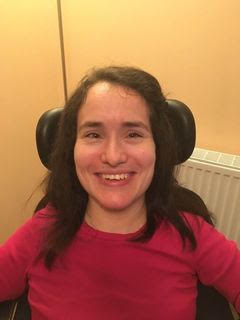
This guest article is written by Charlotte Faragher, a disability rights writer from Oldham. Charlotte, who has had quadriplegic cerebral palsy since birth, has published many articles about disabled dating and intimate relationships.
Loneliness is something that will affect us all at some point in our lives. It is sadly true that irrespective of personal circumstance many of us will have had to tackle this issue with unflinching realism, thanks to Covid 19 and everything that has brought. Yet, I believe there are a particular set of negative voices and presumptions to battle daily if you are a disabled young person in today’s society, as I am.

One of these facets is having to accept what my future may look like, especially as my parents are currently my main care givers. In the years ahead, without a partner or close friend to take over that role, it is most likely I would have to be placed under the permanent care of the local authority. This personally fills me with deep shame, and I have no doubt it would have a severe negative impact on my physical and mental state, thus exacerbating my feelings of loneliness.
I think in this way because it gives the impression that my disability and all its complex components are just too multifaceted and tiring for someone to handle permanently. Additionally, if I were placed in a care home or supported living at a relatively young age, I would have extra time to stew over the lack of significant life experiences I’ve had. Life experiences that would be hampered further by the reduced freedom to do as I please, when I want.
Although I understand that I can greatly reduce the stress felt by my loved ones by being a positive, thankful light in their lives, it does not mean that the enormity of caring for me will magically reduce as a result.
Romantic Relationships
Furthermore, if I were in a romantic relationship there would inevitably be times when a partner would want to lean on me for support. I worry I would not be able to help them through as effectively as I would like. This could lead to us both feeling more isolated and lonelier.
Friendships
When it comes to friendships, I often struggle to make friends or feel genuinely comfortable in a friendship group for two reasons.
1. I worry that the people I want to befriend won’t fully understand or respect the reality of my disability. I am almost fully competent, educationally and emotionally, yet struggle to do many physical activities that others may take for granted. I also think that people will see me as less intelligent and socially aware simply because of my differences.
2. I feel that when going out with friends, they have to put up with extra inconveniences such as things taking longer due to my care needs, or choice of venues being limited due to poor access.
Paranoid Thinking?
I often wonder if my friends enjoy the experiences less, simply because I am there. Are their assurances that they are unbothered by these changes to their normal night out genuine? Is it better to be lonely than experience friendship induced paranoia?
To summarise, I am aware that one way to reduce my paranoia and feelings of loneliness is to try to remember that I am an awesome, valuable person who has just as much right to a rich and beautiful life as anyone else.
Indeed, friendships are a key element to humans not just surviving but thriving. I also could get out and socialize more and stop assuming that everyone has negative and apprehensive feelings towards me and my disability. It could, in fact, enhance our relationships.
If people were more open and outwardly accepting of others with differences, it would allow me to feel more loved and valued in the body I have, just as I am. So let’s work together!
Follow Our Loneliness Campaign
This article by Charlotte Faragher is part of Enhance The UK’s disability and loneliness camaign. For tips on overcoming loneliness and for more insightful articles search the hashtag #DisabilityAndLoneliness and follow our campaign. We’re @ETUKUndressing on twitter and on Instagram @UndressingDisability.
More from Charlotte
If you enjoyed this article by Charlotte you can read more from her in this article about romantic relationships. You can also connect with her on Facebook and Twitter.
